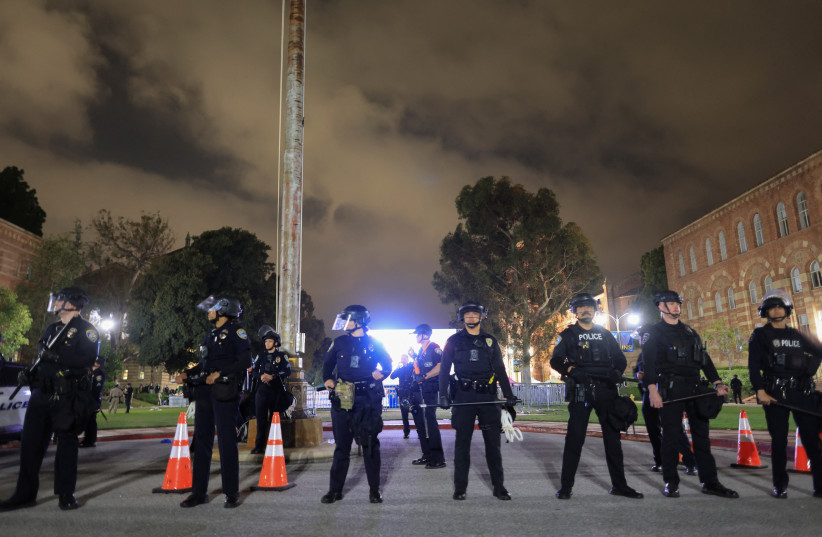(JTA) – Much of the national debate over the campus pro-Palestinian protest movement has focused on whether the encampments or similar actions are fomenting antisemitism.
Critics of the encampments have cited viral episodes of outright antisemitism as evidence of a widespread problem, while the encampments’ proponents - including some Jewish students - have insisted that antisemitic attitudes and rhetoric are rare.
Now, a new survey of Jewish students has found that the protests made many of the respondents feel less safe. Less than half of Jewish students said their campuses had encampments. But at schools that did, a majority of the students said the protests featured antisemitic rhetoric and impacted their campus experience in some way. Nearly three-quarters of Jewish students at those schools said they wanted the encampments removed.
Hillel International, an organization that serves Jewish students and supports Israel, published the results of the survey Monday. Conducted by the polling firm Benenson Strategy Group in early May, the survey polled 310 self-identified Jewish college students nationwide about their thoughts on the encampments and other pro-Palestinian protests, and has a margin of error of 5%. Of those surveyed, 34% were involved in Hillel in some capacity, according to a spokesperson.
“Jewish students, and all students, deserve to pursue their education and celebrate their graduations free from disruption, antisemitism, and hate,” Adam Lehman, president and CEO of Hillel International, said in a press release announcing the survey findings.
Jewish students' safety concerns

The survey found that 61% of Jewish students who have witnessed pro-Palestinian protests at their school say they have included language they found “antisemitic, threatening or derogatory toward Jewish people.” About the same proportion - 63% - say they feel less safe at their schools as a result of the rise in protests, with 58% at schools with encampments chalking that feeling up to the tent protests specifically. Forty percent of Jewish students overall say they have felt the need to hide their Jewish identity while on campus this year.
And 72% of the Jewish students who have witnessed encampments at their school want their schools to act to remove them in order to reduce the possibility that their commencements will be disrupted - a controversial step that several schools have faced blowback for taking. Pollsters didn’t offer students any choices in how universities might remove the encampments.
Another 16% of respondents said the schools should take no action toward the encampments, while 12% said they weren’t sure.
Those students said they’ve been forced to move through protests to navigate campus; blocked from getting to class altogether; and changed how they socialized on campus, among other ways their experiences have been affected. A smaller number said they had been verbally or physically assaulted.
The survey did not provide space for students to define what language they considered antisemitic, according to the representative. Many popular pro-Palestinian phrases, including “From the river to the sea, Palestine will be free,” are considered by most mainstream Jewish groups to be antisemitic, though others including the anti-Zionist Jewish Voice for Peace say they are not.
Universities have struggled to balance their commitment to free speech with their stated desire to assure the safety of Jewish students in the wake of the encampment movement that began at Columbia University last month before spreading nationwide. The encampments protest Israel’s war against Hamas in Gaza and demand that colleges divest from companies that do business in Israel. Amid reports of disruptive and antisemitic behavior emanating from the encampments over the last several weeks, law enforcement agencies have moved to dismantle many of them, arresting more than 2,500 people.
This has led to a situation in which many progressives and free-speech advocates have chastised schools for an inappropriate show of force, while organized Jewish groups, including Hillel and the Anti-Defamation League, have taken those same schools to task for not being more forceful. Recent university efforts to reach negotiated deals with the encampments have further enraged the ADL and other Jewish groups.
Lehman said, “Our findings demonstrate that a majority of Jewish students surveyed have experienced bias and discrimination in their classroom and academic experiences based on faculty and staff abusing their authority in support of the rule-breaking and unlawful anti-Israel encampments and protests.” He pushed university heads “to address these hostile and discriminatory conditions,” without specifying how.
Protests continued over the weekend. Some Duke University students booed and walked out of a commencement address delivered by Jewish comedian Jerry Seinfeld, who has visited Israel after Oct. 7 and whose wife has donated to pro-Israel causes (including a counter-protester group).
And Johns Hopkins University and the University of Wisconsin-Milwaukee became the latest schools to reach deals with protesters. Among other terms, the former school agreed to conduct what it called “a timely review of the protesters’ key question of divestment, using the university’s existing process,” while the latter agreed to meet with protest leaders to discuss the university’s investments in Israel and to encourage a local group of water companies to cut ties with two Israeli enterprises.
